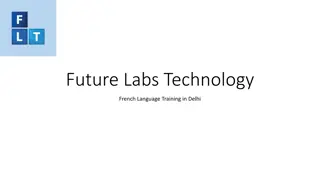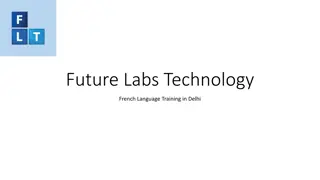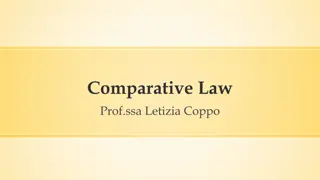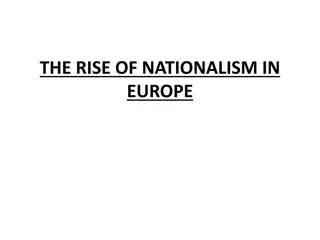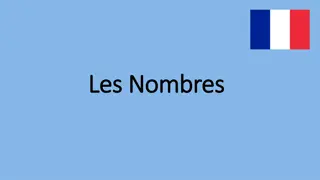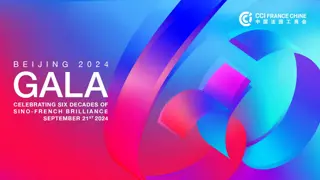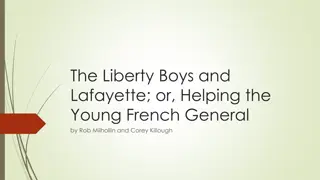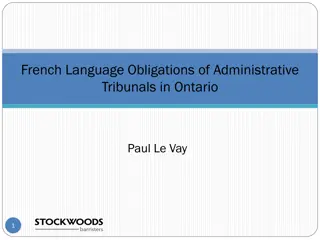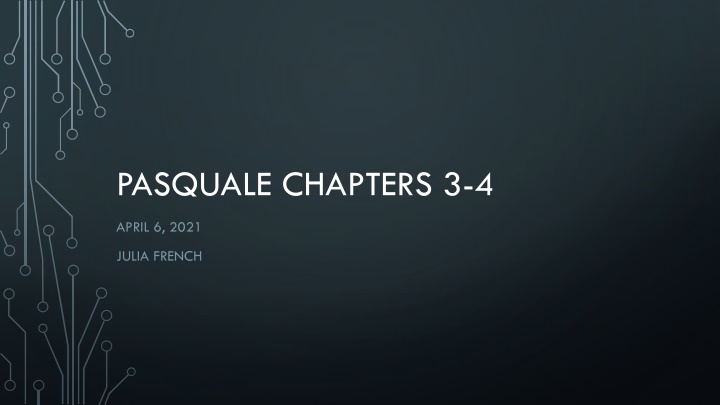
Exploring Educational Goals, Models, and Technology in Modern Education
Dive into the discussion surrounding the aims of education, different models of education, and the impact of technology in today's world. Explore the debate on whether educational goals should encompass softer skills, the relevance of traditionalist vs. experimentalist approaches, and the benefits and concerns of leveraging education technology.
Download Presentation

Please find below an Image/Link to download the presentation.
The content on the website is provided AS IS for your information and personal use only. It may not be sold, licensed, or shared on other websites without obtaining consent from the author. If you encounter any issues during the download, it is possible that the publisher has removed the file from their server.
You are allowed to download the files provided on this website for personal or commercial use, subject to the condition that they are used lawfully. All files are the property of their respective owners.
The content on the website is provided AS IS for your information and personal use only. It may not be sold, licensed, or shared on other websites without obtaining consent from the author.
E N D
Presentation Transcript
PASQUALE CHAPTERS 3-4 APRIL 6, 2021 JULIA FRENCH
CHAPTER 3 BEYOND MACHINE LEARNERS CROSSROADS OF THE CHAPTER: WHETHER WE ARE GOING TO INVEST IN EDUCATIONAL AI THAT IS CONSTANTLY MEASURING AND EVALUATING STUDENTS, OR IF WE WILL FOCUS OUR ENERGIES ON PRODUCTS THAT ADVANCE LEARNING IN MORE SUPPORTIVE AND CREATIVE WAYS
THE AIMS OF EDUCATION 1. Learning verbal and mathematical/logical/quantitative skills and substantive knowledge in history, social studies, the arts, science, and other fields 2. Preparing for a vocation or career, via skills training, or a profession, via the development of substantive knowledge and critical judgement 3. Competing for better opportunities in education and employment 4. Learning social skills and emotional intelligence 5. Preparing for citizenship, including civic engagement and participation in civil society
THE AIMS OF EDUCATION 1. Learning verbal and mathematical/logical/quantitative skills and substantive knowledge in history, social studies, the arts, science, and other fields 2. Preparing for a vocation or career, via skills training, or a profession, via the development of substantive knowledge and critical judgement 3. Competing for better opportunities in education and employment 4. Learning social skills and emotional intelligence 5. Preparing for citizenship, including civic engagement and participation in civil society Should these goals be reframed to be more inclusive of these softer skills then? How would Vallor approach redefining some of these goals? Or would she advocate for creating entirely new ones?
3 GENERAL VISIONS OF EDUCATION PRAGMATIC MODERNIZERS OR BEHAVIORISTS TRADITIONALIST EXPERIMENTALISTS - To bind the generations with a common (if evolving) experience of the best that has been thought and said - Vocational need to train students for jobs - Learning how to learn - Important because social and technology conditions are changing so rapidly - Teach students specific skills for the specific job opportunities available Which of these models make the most sense to pursue in a technology-saturated world? Are some better than others? How have your previous schooling experiences informed your view of these approaches, if at all?
BENEFITS OF EDUCATION TECH Personalized lessons Could dissolve the boundary between work and play Assist students at a hyper-individualized level and identify struggling students sooner Some concerns The exploitation of data (surveillance, monetization, total behavior records ) A failure to teach soft skills and achieve all aims of education A disconnect with reality? Do we want this barrier between work and play to dissolve? What value is there to friction in learning? Should we worry about the gamification and hyper-personalization of learning?
EDUCATION TECHNOLOGY ON THE INTERNATIONAL STAGE Central question of section: Can education technology create education equity? His answer: No. Challenges in losing the human aspect of education, culturally imposing lesson plans on non-Western communities, and devaluing teaching as a profession
PASQUALES SOLUTION: HUMANE EDUCATION More to teaching than just conveying information Despite all the popular talk of digital natives, evidence of digital illiteracy is rife Consider Education Technology Agencies (ETAs) that could help with the design, testing, and implementation of EdTech Composed of teachers, schools, parents, and even students What do we think of his solution? Are ETAs feasible to effectively monitor how technology becomes integrated into the classroom, or is such regulation too optimistic?
CHAPTER 4 THE ALIEN INTELLIGENCE OF AUTOMATED MEDIA CENTRAL PROBLEM: SOFTWARE ENGINEERS HAVE TAKEN ON ROLES ONCE FILLED BY NEWSPAPER EDITORS AND LOCAL NEWSCAST PRODUCERS, BUT AT A DISTANCE. THEY CHOOSE CONTENT AND ADVERTISEMENTS FOR CONSTANTLY SHIFTING, ALGORITHMICALLY CURATED AUDIENCES.
3 PROBLEMS AND SOLUTIONS UNKNOWN OR UNIDENTIFIED AI BOTS EXPLOITATION OF MEDIA DESTRUCTIVE ECONOMICS AGAINST THE TRUTH AI that is blind to the substance of communication is an easy target for extremists, frauds, and criminals Platforms boosted by this AI are siphoning revenue and attention away from the very media sources that are exposing their failures, leaving platforms ever less challenged in their conquest of communication channels Black-boxed AI means we cannot understand how new media environment is being constructed, or if we are interacting with bots or humans - Only human reviewers can detect, defuse and deflect these harms - Need attribution and disclosure of whether we are interacting with human, AI, or a mix - Economics of digital media need to shift to stop this destructive cycle
ADDRESSING THE EXPLOITATION OF MEDIA CONTENT MODERATORS professional journalists or trained moderators who work alongside the tech companies Can act as fact-checkers, screeners, and labelers for destructive content online, particularly on social media when the algorithm would otherwise promote it Are these jobs realistic? AI is used to filter content because it s a laborious task and AI are cheaper to employ, so what would incentivize both companies and journalists to pick up this role?
CHANGING THE DESTRUCTIVE ECONOMICS OF MEDIA REGULATION to stop the arms race for attention Governance can insist that humans remain in control of how people engage with media and how media engages with them Successful test-run of humane automation: EU s Right to be Forgotten Further regulation and governance, at least as Pasquale describes it, doesn t seem to address the inherently addictive aspects of media and the attention economy itself. Is getting the public more involved going to be enough? Or should the burden fall more heavily on the companies themselves?
ESTABLISHING A FRAMEWORK OF RESPONSIBILITY Based on Pasquale s statement: free expression protection applies to people first and AI systems second, it at all Leading firms need to take responsibility for what they prioritize or publish If tech firms cannot take responsibility for being global communication regulators they must be broken up in order to make way for human-scale entities capable of doing so What do we think of this solution? Is auditing data and attributing responsibility feasible for AI governance? Who would be responsible for enforcing this framework?






